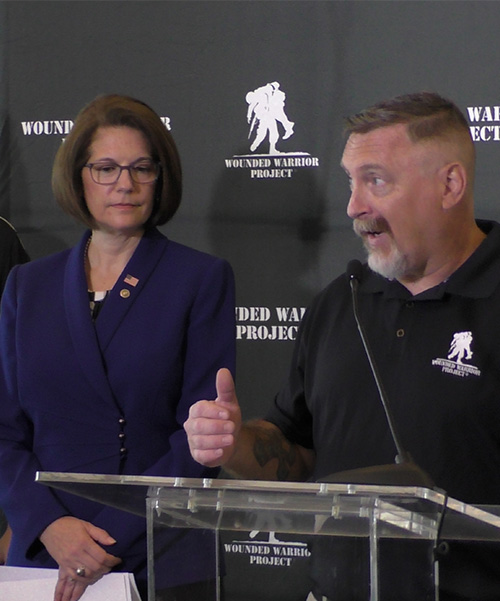Legislative Movement Impacting Warriors

Wounded Warrior Project continues to advocate for legislation that will improve the lives of veterans and ensure they and their loved ones receive the care and support they deserve.
S. 2280 / H.R. 855, The Veterans Expedited TSA Screening (VETS) Safe Travel Act
- Traveling through airport security with prosthetics, wheelchairs, or other mobility aids presents a challenge. The Veterans Expedited Transportation Security Administration (TSA) Screening (VETS) Safe Travel Act will provide many severely injured veterans a more dignified experience when passing through security checkpoints.
- When it’s passed, about 300,000 veterans who are amputees, paralyzed, blind, or require an assistive device for mobility will qualify for expedited security screening under TSA Pre-Check. This benefit is already available to active duty, reserves, and National Guard Service members at no cost.
“I used to get stopped every time I flew in security because of my prosthetic or metal in my legs from injury. Not until I purchased TSA pre-check on my own did they stop having me remove clothing or examine my bags outside of X-ray when I traveled. It was stressful and embarrassing each time and should not have been needed with my military ID.” – Mike Owens, USMC
S.344 / H.R. 1282, The Major Richard Star Act
- Retired Service members are entitled to retirement pay from the Department of Defense (DoD) and disability compensation from the Department of Veterans Affairs (VA) if they were injured while in service. Only military retirees with at least 20 years of service and a disability rating of at least 50% can collect both benefits at the same time. For all other retirees, including those whose careers were cut short due to injury, current law requires a dollar-for-dollar offset of these two benefits, meaning the veteran has to forfeit a portion of the benefits they earned in service.
- Under the Major Richard Star Act, former Service members who were medically retired with less than 20 years of service (Chapter 61 retirees) AND are eligible for Combat-Related Special Compensation (CRSC) would no longer have their benefits reduced by the offset. Instead, they would receive both benefits concurrently.
“Combat-wounded veterans didn’t ask to be medically discharged. Their condition was based on an event while serving overseas. I believe we should honor those wounded veterans by allowing them to receive the entirety of what they earned through their selfless service.” – Bill Jones, U.S. Army
S. 2513 / H.R. 4772, Brian Neuman VA Clothing Allowance Act of 2021 / Mark O’Brien Clothing Allowance Act of 2021
- VA provides a clothing allowance to veterans with prosthetics, orthopedic devices, or skin medicine that damages their clothing or requires alterations, as long as their condition results from military service. However, veterans must reapply for the benefit every year. Most of the eligible veterans have lifelong conditions that warrant the allowance. Last year, about 40,000 veterans were approved for a clothing allowance.
- These bills aim to reduce the annual claim filing burden. If passed, payments would automatically continue each year until the veteran elects to no longer receive payments or VA determines the veteran is no longer eligible.
Read more about warriors Brian Neuman and Mark O’Brien.
About Wounded Warrior Project
Since 2003, Wounded Warrior Project® (WWP) has been meeting the growing needs of warriors, their families, and caregivers — helping them achieve their highest ambition. Learn more.